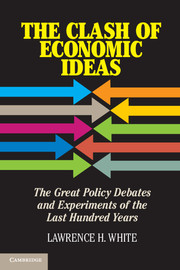Book contents
- Frontmatter
- Contents
- Figures
- Acknowledgments
- Introduction
- 1 The Turn Away from Laissez-Faire
- 2 The Bolshevik Revolution and the Socialist Calculation Debate
- 3 The Roaring Twenties and Austrian Business Cycle Theory
- 4 The New Deal and Institutionalist Economics
- 5 The Great Depression and Keynes’s General Theory
- 6 The Second World War and Hayek’s Road to Serfdom
- 7 Postwar British Socialism and the Fabian Society
- 8 The Mont Pelerin Society and the Rebirth of Smithian Economics
- 9 The Postwar German “Wonder Economy” and Ordoliberalism
- 10 Indian Planning and Development Economics
- 11 Bretton Woods and International Monetary Thought
- 12 The Great Inflation and Monetarism
- 13 The Growth of Government
- 14 Free Trade, Protectionism, and Trade Deficits
- 15 From Pleasant Deficit Spending to Unpleasant Sovereign Debt Crisis
- Index
- References
2 - The Bolshevik Revolution and the Socialist Calculation Debate
Published online by Cambridge University Press: 05 June 2012
- Frontmatter
- Contents
- Figures
- Acknowledgments
- Introduction
- 1 The Turn Away from Laissez-Faire
- 2 The Bolshevik Revolution and the Socialist Calculation Debate
- 3 The Roaring Twenties and Austrian Business Cycle Theory
- 4 The New Deal and Institutionalist Economics
- 5 The Great Depression and Keynes’s General Theory
- 6 The Second World War and Hayek’s Road to Serfdom
- 7 Postwar British Socialism and the Fabian Society
- 8 The Mont Pelerin Society and the Rebirth of Smithian Economics
- 9 The Postwar German “Wonder Economy” and Ordoliberalism
- 10 Indian Planning and Development Economics
- 11 Bretton Woods and International Monetary Thought
- 12 The Great Inflation and Monetarism
- 13 The Growth of Government
- 14 Free Trade, Protectionism, and Trade Deficits
- 15 From Pleasant Deficit Spending to Unpleasant Sovereign Debt Crisis
- Index
- References
Summary
Vladmir Lenin sent warm greetings in April 1919 to the socialist revolutionaries who had just seized power in Munich and declared a Bavarian Soviet Republic. Drawing on his experience eighteen months earlier leading the Bolshevik Revolution that gave Russia a Soviet Socialist government, he asked them about a checklist of concrete measures they might take, urging their “most urgent and most extensive implementation”:
[H]ave councils of workers and servants been formed in the different sections of the city; have the workers been armed; have the bourgeoisie been disarmed; has use been made of the stocks of clothing and other items for immediate and extensive aid to the workers, and especially to the farm labourers and small peasants; have the capitalist factories and wealth in Munich and the capitalist farms in its environs been confiscated; have mortgage and rent payments by small peasants been cancelled; have the wages of farm labourers and unskilled workers been doubled or trebled; have all paper stocks and all printing-presses been confiscated so as to enable popular leaflets and newspapers to be printed for the masses; has the six-hour working day with two or three-hour instruction in state administration been introduced; have the bourgeoisie in Munich been made to give up surplus housing so that workers may be immediately moved into comfortable flats; have you taken over all the banks; have you taken hostages from the ranks of the bourgeoisie; have you introduced higher rations for the workers than for the bourgeoisie; have all the workers been mobilised for defence and for ideological propaganda in the neighbouring villages?
The list concisely summarizes Lenin’s immediate agenda for consolidating power by winning over the workers. The absence of any suggestions for longer-range economic strategy hints at the problem Lenin himself faced in Moscow: because there were no concrete guidelines from Marx and Engels, economic policy had to be improvised.
- Type
- Chapter
- Information
- The Clash of Economic IdeasThe Great Policy Debates and Experiments of the Last Hundred Years, pp. 32 - 67Publisher: Cambridge University PressPrint publication year: 2012



